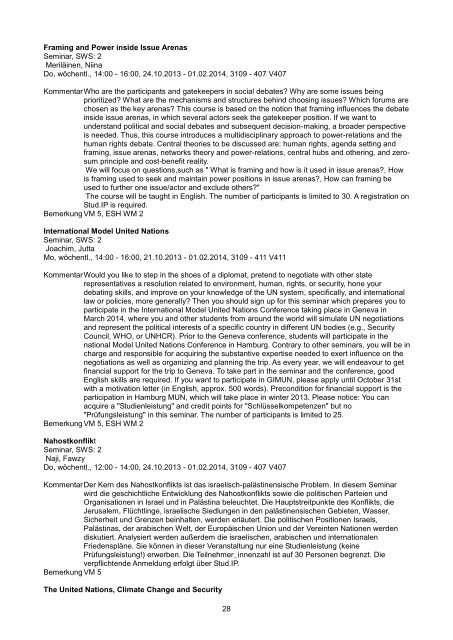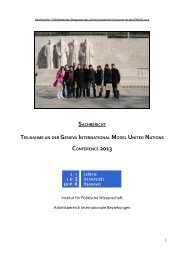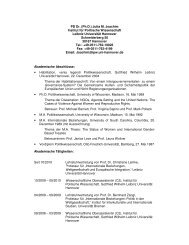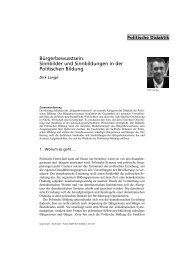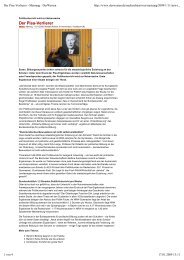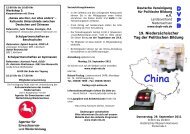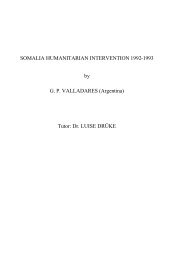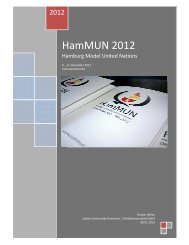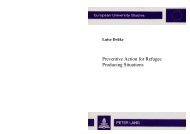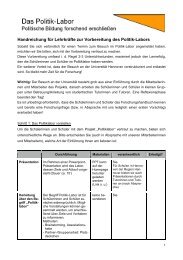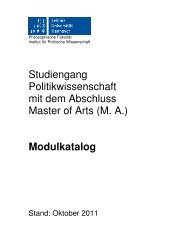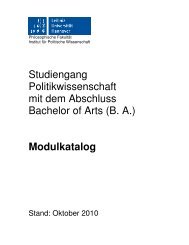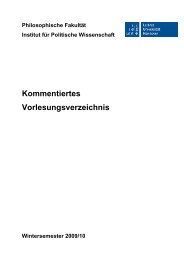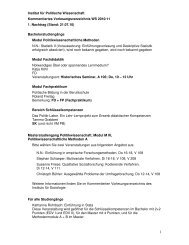Politik - Institut für Politische Wissenschaft - Leibniz Universität ...
Politik - Institut für Politische Wissenschaft - Leibniz Universität ...
Politik - Institut für Politische Wissenschaft - Leibniz Universität ...
Erfolgreiche ePaper selbst erstellen
Machen Sie aus Ihren PDF Publikationen ein blätterbares Flipbook mit unserer einzigartigen Google optimierten e-Paper Software.
Framing and Power inside Issue Arenas<br />
Seminar, SWS: 2<br />
Meriläinen, Niina<br />
Do, wöchentl., 14:00 - 16:00, 24.10.2013 - 01.02.2014, 3109 - 407 V407<br />
Kommentar Who are the participants and gatekeepers in social debates? Why are some issues being<br />
prioritized? What are the mechanisms and structures behind choosing issues? Which forums are<br />
chosen as the key arenas? This course is based on the notion that framing influences the debate<br />
inside issue arenas, in which several actors seek the gatekeeper position. If we want to<br />
understand political and social debates and subsequent decision-making, a broader perspective<br />
is needed. Thus, this course introduces a multidisciplinary approach to power-relations and the<br />
human rights debate. Central theories to be discussed are: human rights, agenda setting and<br />
framing, issue arenas, networks theory and power-relations, central hubs and othering, and zerosum<br />
principle and cost-benefit reality.<br />
We will focus on questions,such as " What is framing and how is it used in issue arenas?, How<br />
is framing used to seek and maintain power positions in issue arenas?, How can framing be<br />
used to further one issue/actor and exclude others?"<br />
The course will be taught in English. The number of participants is limited to 30. A registration on<br />
Stud.IP is required.<br />
Bemerkung VM 5, ESH WM 2<br />
International Model United Nations<br />
Seminar, SWS: 2<br />
Joachim, Jutta<br />
Mo, wöchentl., 14:00 - 16:00, 21.10.2013 - 01.02.2014, 3109 - 411 V411<br />
Kommentar Would you like to step in the shoes of a diplomat, pretend to negotiate with other state<br />
representatives a resolution related to environment, human, rights, or security, hone your<br />
debating skills, and improve on your knowledge of the UN system, specifically, and international<br />
law or policies, more generally? Then you should sign up for this seminar which prepares you to<br />
participate in the International Model United Nations Conference taking place in Geneva in<br />
March 2014, where you and other students from around the world will simulate UN negotiations<br />
and represent the political interests of a specific country in different UN bodies (e.g., Security<br />
Council, WHO, or UNHCR). Prior to the Geneva conference, students will participate in the<br />
national Model United Nations Conference in Hamburg. Contrary to other seminars, you will be in<br />
charge and responsible for acquiring the substantive expertise needed to exert influence on the<br />
negotiations as well as organizing and planning the trip. As every year, we will endeavour to get<br />
financial support for the trip to Geneva. To take part in the seminar and the conference, good<br />
English skills are required. If you want to participate in GIMUN, please apply until October 31st<br />
with a motivation letter (in English, approx. 500 words). Precondition for financial support is the<br />
participation in Hamburg MUN, which will take place in winter 2013. Please notice: You can<br />
acquire a "Studienleistung" and credit points for "Schlüsselkompetenzen" but no<br />
"Prüfungsleistung" in this seminar. The number of participants is limited to 25.<br />
Bemerkung VM 5, ESH WM 2<br />
Nahostkonflikt<br />
Seminar, SWS: 2<br />
Naji, Fawzy<br />
Do, wöchentl., 12:00 - 14:00, 24.10.2013 - 01.02.2014, 3109 - 407 V407<br />
Kommentar Der Kern des Nahostkonflikts ist das israelisch-palästinensische Problem. In diesem Seminar<br />
wird die geschichtliche Entwicklung des Nahostkonflikts sowie die politischen Parteien und<br />
Organisationen in Israel und in Palästina beleuchtet. Die Hauptstreitpunkte des Konflikts, die<br />
Jerusalem, Flüchtlinge, israelische Siedlungen in den palästinensischen Gebieten, Wasser,<br />
Sicherheit und Grenzen beinhalten, werden erläutert. Die politischen Positionen Israels,<br />
Palästinas, der arabischen Welt, der Europäischen Union und der Vereinten Nationen werden<br />
diskutiert. Analysiert werden außerdem die israelischen, arabischen und internationalen<br />
Friedenspläne. Sie können in dieser Veranstaltung nur eine Studienleistung (keine<br />
Prüfungsleistung!) erwerben. Die Teilnehmer_innenzahl ist auf 30 Personen begrenzt. Die<br />
verpflichtende Anmeldung erfolgt über Stud.IP.<br />
Bemerkung VM 5<br />
The United Nations, Climate Change and Security<br />
28


